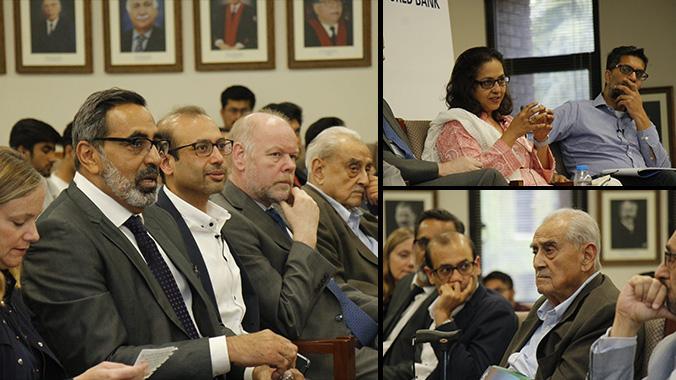
The launch ceremony of the Pakistan@100 Report took place on Wednesday, March 27, 2019, at LUMS. The Pakistan@100 Initiative is a World Bank effort to engender more vibrant policy debates on what the future should hold for Pakistan. LUMS is a partner in this effort. The initiative seeks to identify the main changes that will be necessary if Pakistan is to become a strong and confident upper middle-income country by the time it turns 100 years old in 2047. The choices over the next decade will determine Pakistan’s future, whether it rises to the challenges ahead and ushers in a period of reform that transforms the economy, or whether it continues with a rather mixed record of reform implementation, failing to address the key constraints to growth, while another generation of Pakistanis see limited welfare improvements.
A major component of this initiative is a report titled ‘Pakistan@100 – Shaping the Future’, which focuses beyond short-term challenges and on Pakistan’s long-term development. The Pakistan@100 Report is meant to provide an overview of major issues that Pakistan has to grapple with in the coming decades. The event on March 27, 2019 was part of an exercise to get widespread engagement on the report by local stakeholders and exchange views with many different sections of Pakistani society.
The ceremony began with opening remarks by Vice Chancellor LUMS, Dr. Arshad Ahmed, who emphasised the need for significant investments in intellectual capital alongside financial interventions to sustain any positive interventions. This was followed by context setting by Melinda Good, Operations Manager for Pakistan Country Program, World Bank. The report was then briefly presented by Shabih Ali Mohib, Program Leader, World Bank. Then a panel discussion was held where ideas were exchanged regarding the future of Pakistan. The panellists, Mr. Hans Timmer, Chief Economist for South Asia Region, World Bank, Ali Khizar Aslam, Head of Research at Business Recorder, and Dr. Reehana Raza, Economist, Founder IDEAS, Senior Research Associate at the Centre on International Development and Governance at the Urban Institute, discussed Pakistan’s future from various different aspects. Dr. Moeed Yusuf, Associate Vice President at Asia Centre, United States Institute of Peace, moderated this discussion. The event was attended by Syed Babar Ali, founder and patron, LUMS.
Dr. Ali Hasanain, Initiative Director for Pakistan@100, commented that the “initiative has been about thinking constructively about Pakistan’s future and it has been a delight to have a group of fantastic intellectuals take part in the various conversations LUMS hosted as a partner in this Initiative. If we are going to change our destiny, we have to start by thinking rigorously about what is possible and how. To be useful, these ideas must then come alive in widespread discussions. Clearly, this is a work in progress, and we hope to contribute substantially to furthering this mission in the time to come.”








